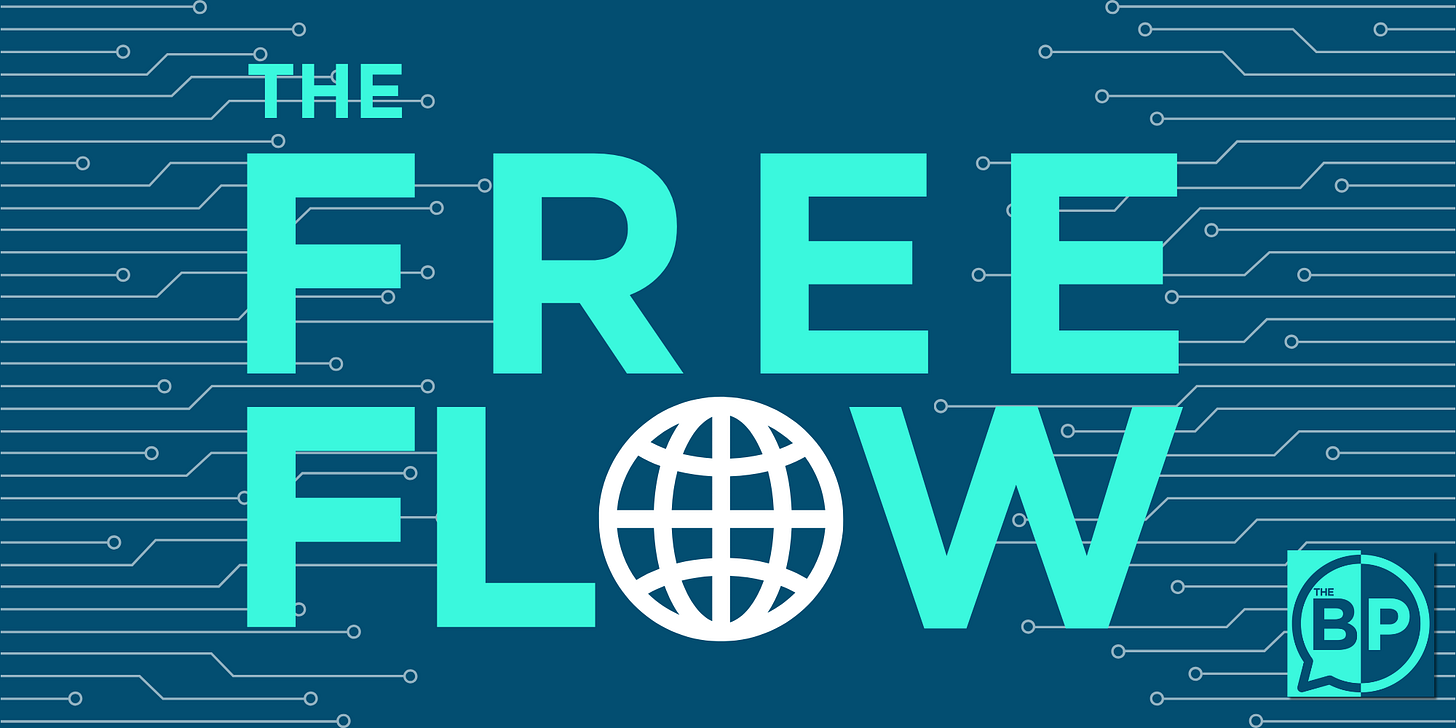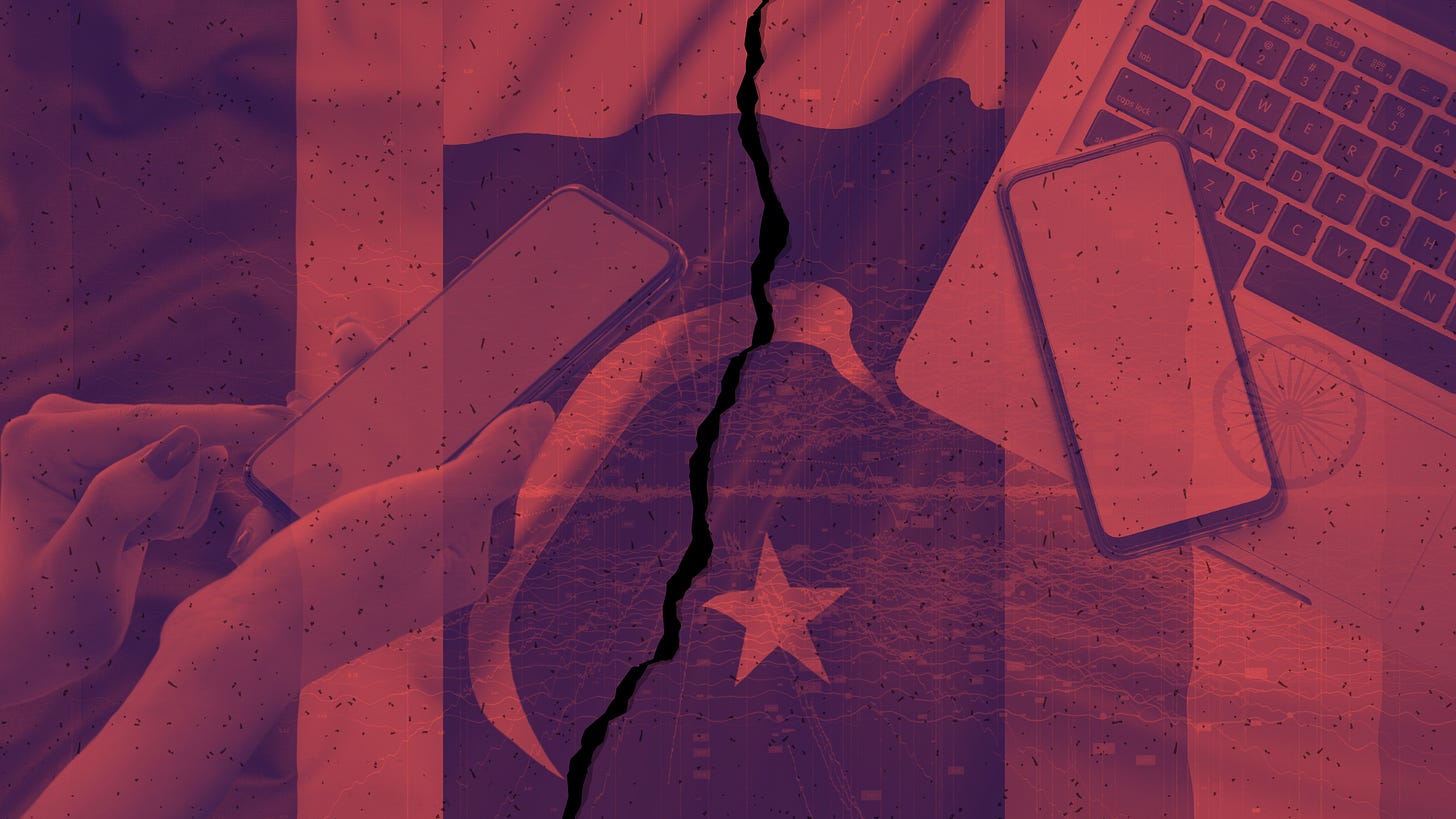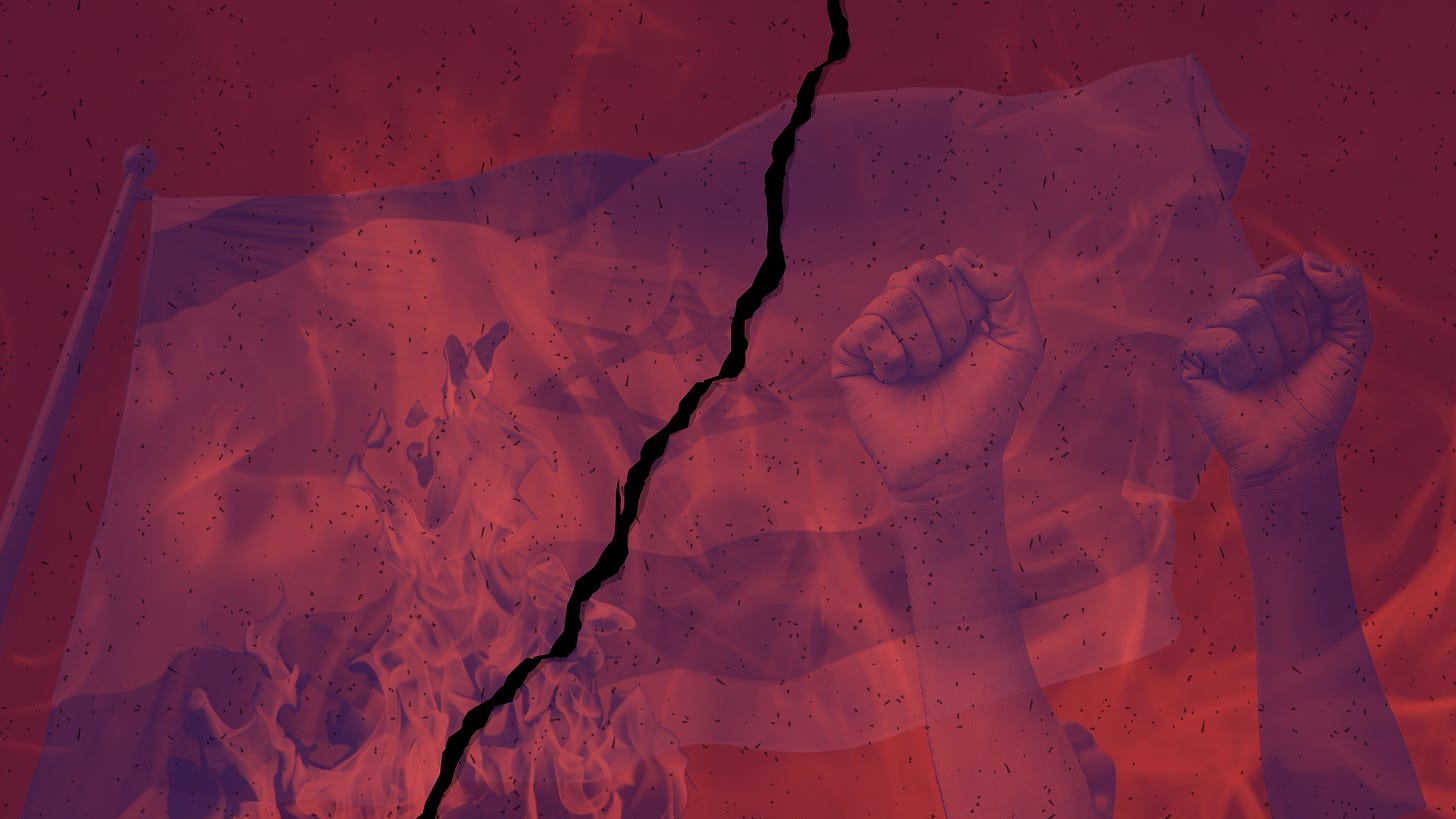Trump Admin to Prosecute Flag Burning & Pakistan 'Blasphemy Traps' Continue to Soar | The Free Flow 8/28/25
An executive order directs prosecution of flag burners, a Russian state messaging app must be downloaded on all devices, entrapment and blasphemy cases surge in Pakistan, and more!
This Week At A Glance 🔎
— 🇺🇲 Trump Order Says Flag Burners Can Be Prosecuted
— 🇷🇺 Russia State-Messaging App Will Be on All Devices
— 🇵🇰 Entrapment and Blasphemy Cases Rise in Pakistan
— 🇵🇹 Portugal Court Forces Wikipedia to Unmask Editors
— 🇮🇳 India Court Rules Speech Protections Don’t Extend to Influencer’s Commercial Speech
First of All 🇺🇲
» Trump Executive Order Says Flag Burners Can Be Prosecuted
On August 25, President Trump issued an Executive Order instructing federal prosecutors to pursue criminal charges against those who burn the American flag, stating such actions "may incite violence and riot."
Context:
Burning the American flag has been recognized as a protected form of political expression since a 1989 Supreme Court ruling in Texas v. Johnson and reaffirmed in United States v. Eichman (1990).
The order directs Attorney General Pam Bondi to prosecute flag-burning cases on other charges, such as disturbing the peace or violating environmental laws.
The 2025 Future of Free Speech Index found that 61% of Americans believe one should be able to insult the national flag, a 10 percentage point decline from 2021.
Our Take: The Supreme Court has twice ruled that the burning of the American flag, however offensive, is protected expression under the First Amendment. The executive order does not change that bedrock precedent; it merely signals the administration’s disregard for it. The order cloaks itself in references to violation of ‘content-neutral’ laws, but its premise–that flag burning is uniquely offensive and must therefore be punished– reveals that it is directly aimed at suppressing a particular viewpoint. The American flag deserves respect, but our freedoms it represents deserve protection. — Ashkhen Kazaryan
» Trump Administration to Re-Vet All 55 Million Visa Holders
The State Department announced plans to vet all 55 million foreigners who currently hold U.S. travel visas. Officials said visas could be revoked for signs of overstays, criminal activity, public safety threats, or support for terrorism.
Details:
The order further expands vetting processes, following the administration's announcement that it would scan visa holders’ social media for hostility towards the U.S.
A State Department spokesperson said, "We are gathering more information than ever," and the re-vetting process will review immigration data, law enforcement records, and “any other information that comes to light after issuance.”
Throughout the 2024 fiscal year, the State Department issued near 11 million temporary visas for business, tourism, students, and visiting academics.
Our Take: While the government has broad power over admission onto US soil, it cannot retaliate against the protected expression of noncitizens who are lawfully present in the United States. — Ashkhen Kazaryan
» FTC Warns Big Tech: Don’t Cave to EU and UK on Encryption and Speech
Federal Trade Commission Chairman Andrew Ferguson sent warnings to major U.S. tech companies, cautioning them to resist foreign attempts to compromise Americans’ privacy or free speech, which may violate federal law.
Details:
The letter said compliance with the EU’s Digital Services Act and the UK’s Online Safety Act could infringe on the FTC’s prohibition against “unfair and deceptive practices in the marketplace.”
The FTC press release stressed that foreign mandates “incentivize tech companies to censor worldwide speech” and warned against simplifying foreign compliance by over-censoring Americans.
The Digital Age 🤖
» Russia to Mandate State Messaging App on All Smartphones
On Thursday, the Russian government announced that MAX, a state-backed messenger app, must be pre-installed on all mobile phones and tablets sold in Russia starting from September 1, 2025, among other mandatory installations.
Details:
Russia’s app store, RuStore, will be pre-installed on Apple devices and is already on Android products.
Starting January 1st, all smart TVs sold in the country will have the Russian-language TV app, LIME HD TV.
The mandate follows government restrictions on WhatsApp and Telegram phone calls after the companies allegedly failed to share information with law enforcement in investigations related to fraud and terrorism.
» Update: Entrapment & Blasphemy Cases in Pakistan Continue to Rise
As we highlighted in the May 8 edition of The Free Flow, Pakistan’s “blasphemy business” has entrapped hundreds of young people under the Prevention of Electronic Crimes Act (PECA) and blasphemy laws.
A new New York Times investigation confirms those patterns and shows the situation worsening:
Arrests Surge: Cases have exploded from 11 in 2020 to 767 in just the first seven months of 2024, following harsher punishments passed in 2023
Entrapment Tactics: Families recount how online chats with women posing as job recruiters turned into blasphemy charges after manipulated content was forwarded
Mob Violence & Courts: At least 10 accused were killed by mobs last year, while a Rawalpindi court sentenced five men to death for online blasphemy in March
Institutional Shifts: Pakistan has now restructured its cybercrime wing into the National Cyber Crime Investigation Agency, with a dedicated focus on digital blasphemy cases
Brief Legal Hope Quashed: A court briefly called for an independent inquiry into the misuse of blasphemy laws, but the order was quickly suspended by a higher court
Our Take: Pakistan’s growing intolerance is a disturbing example of the flawed logic behind the comeback of disguised blasphemy laws in countries like Denmark, Sweden, and UK (as I cover here and here). Protecting religious ideas and feelings from offense does not promote social peace or tolerance; it encourages sectarian lawfare and legitimizes the Assassin's Veto. — Jacob Mchangama
» India’s Supreme Court Orders Public Apologies From Content Creators
In a hate speech case involving five YouTube creators, India’s Supreme Court ruled that free speech protections do not extend to “commercial speech.”
In Court:
A petition filed by the Cure Spinal Muscular Atrophy Foundation of India argued that remarks made by comedian Samay Raina and four other content creators constituted hate speech and violated constitutional safeguards for equality and dignity.
The court ruled that such speech is not protected when disseminated as part of commercialized content.
Justice Bagchi said, “When you are commercializing speech, you cannot use a community and hurt their sentiments.”
The Court ordered the creators to issue public apologies on their social platforms and file affidavits outlining how they would use their influence to raise awareness of disability rights.
It has reserved its decision on whether penalties or costs will be imposed.
The Brussels Effect: Europe and Beyond 🇪🇺
» Portugal Court Forces Wikipedia to Remove Content, Unmask Editors
In a landmark ruling, Portugal’s Supreme and Constitutional Courts ordered the Wikimedia Foundation (WMF) to remove disputed content from businessman César DePaço’s Wikipedia page and disclose the identities of eight volunteer editors who added the material.
The Ruling:
WMF has long argued that, because it does not directly edit Wikipedia, it cannot be held liable for user-generated content.
But the court dismissed this claim, ruling that “libel is libel,” regardless of the publishing model.
The August 2025 compliance marks the first time WMF has both removed content and unmasked contributors in a European defamation case.
Our Take: Regardless of whether the content hosted by Wikipedia is of a defamatory nature, this Court ruling has serious free speech implications. It fails to properly recognise that intermediaries like Wikipedia play a fundamental role in facilitating speech and the free flow of ideas by creating a platform for users to publish and disseminate their own content, including anonymously. For this role to be exercised appropriately, platforms shall not be legally compelled to act as arbiters of legality or to erode the anonymity protections of their users when they have chosen to implement such a mode of publication.
Furthermore, the fact that intermediaries have and implement their own content moderation policies shall never be interpreted as meaning that these intermediaries acquire editorial responsibility. This decision adds to other legal threats for the operation of a collaborative non-profit model such as Wikipedia across different jurisdictions, as we have seen in relation to recent regulatory decisions in the UK, where the platform may be categorised as an intermediary service subject to burdensome and disproportionate requirements compromising users' rights to privacy, safety, free speech, and association. — Joan Barata
» 4chan Refuses UK Fines, Appeals to Trump Administration
UK Online Safety Act enforcer, Ofcom, is facing a legal challenge from websites 4chan and Kiwi Farms. The websites have filed a case in the U.S. to prevent Ofcom from enforcing the legislation against them.
Details:
The legislation does not apply solely to UK-based services, but can also target websites with a significant number of UK users or a UK target market.
The websites, owned by 4Chan Community Support LLC and Lolcow LLC, have been under fire for misogynistic campaigns, conspiracy theories, and trolling.
Kiwi Farms:
OfCom has reportedly written to Kiwi Farms twice, instructing it to comply with an assessment of illegal content risk.
4chan:
OfCom issued a provisional notice of contravention to 4chan following investigations into illegal content, during which the company allegedly failed to comply with information requests.
The company expects to be issued a £20,000 fine, with daily penalties to follow.
4chan has asked the Trump administration to “invoke all legal levels” to shield the platform from UK law enforcement.
They also want U.S. courts to declare that the Online Safety Act is in conflict with the U.S. Constitution.
Free Speech Recession 🌎
» Finland Court Fines Man for Burning Israeli Flag
A 36-year-old member of the far-right Blue-and-Black Movement has been fined for incitement against Jewish people after posting videos of himself burning an Israeli flag.
Details:
The Southwest Finland District Court fined the man a total of €1,650 (over $1,900).
He has reportedly referenced National Socialism several times online, and his profile states he is a member of the Blue-and-Black movement.
» Over 20 Protestors Arrested in The Gambia
Law enforcement officers in The Gambia have arrested 23 peaceful youth protesting the Public Utilities Regulatory Authority after using tear gas to disperse demonstrators.
Details:
The protest was against PURA’s decision to impose a data price floor for mobile internet services.
On August 22, the day of the protest, 19 protesters were arrested, while 14 individuals were arrested later on their way to the National Assembly.
Three protestors have since been released on conditional bail, while prominent activists, artists, and journalists remain detained.
In The Gambia, current legislation requires police permits for public gatherings and fails to meet international human rights standards.
Ashley Haek is a communications coordinator and research assistant at The Future of Free Speech.
Ava Sjursen is a communications intern at The Future of Free Speech and a student at Boston College studying communications and political science.
Jacob Mchangama is the Executive Director of The Future of Free Speech and a research professor at Vanderbilt University. He is also a senior fellow at The Foundation for Individual Rights and Expression (FIRE) and the author of Free Speech: A History From Socrates to Social Media.
Ashkhen Kazaryan is a Senior Legal Fellow at The Future of Free Speech, where she leads initiatives to protect free expression and shape policies that uphold the First Amendment in the digital age.
Joan Barata is a Senior Fellow at The Future of Free Speech and a Fellow of the Program on Platform Regulation at the Stanford Cyber Policy Center. He works on freedom of expression, media regulation, and intermediary liability issues.








